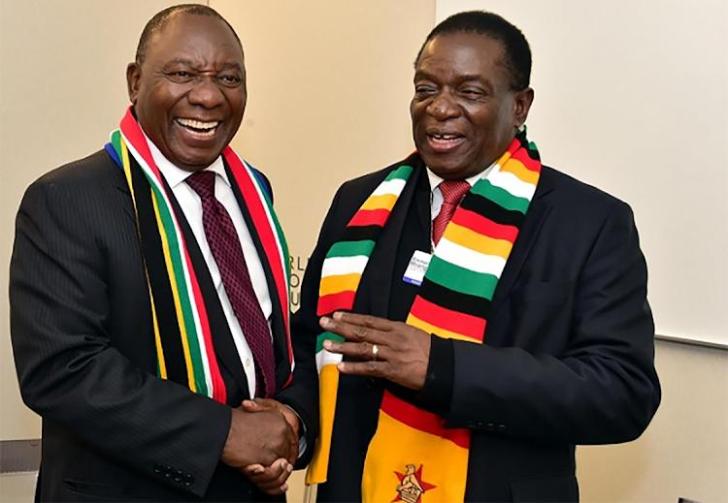News / Local
Mnangagwa in South Africa to witness 'the return of apartheid'?
19 Jun 2024 at 07:59hrs |
0 Views

President Mnangagwa has arrived in South Africa for the inauguration of his South African counterpart, President Cyril Ramaphosa.
South Africa's African National Congress and the Democratic Alliance have agreed to form a coalition in which the former liberation movement and the pro-business party will set aside their rivalry in an historic governance pact. The ANC lost its parliamentary majority in 29 May elections for the first time since it swept to power in 1994 at the end of apartheid.
The swearing-in, which will be graced by world leaders, will be held tomorrow at the Union Building in Pretoria, the administrative capital of South Africa.
The President is accompanied by the acting Minister of Foreign Affairs and International Trade, Professor Amon Murwira; Deputy Chief Secretary, Mr George Charamba, and senior Government officials.
He was received at the Waterkloof Air Force base by Zimbabwe Ambassador to South Africa, David Hamadziripi and South African Government officials.
The free-market-supporting DA, which received almost 22% of the vote, backed Ramaphosa's election by lawmakers for a second term.
An ANC-DA coalition was favoured by large businesses and international investors.
Two smaller parties, the Inkatha Freedom Party (IFP), a Zulu nationalist party, and the Patriotic Alliance (PA), which wants to bring back the death penalty and deport illegal immigrants, have also said they will join the government.
The inclusion of the IFP, which received 3.8% of the vote, is seen as a way to deflect criticism of the ANC for working with the white-led DA. The PA, led by the self-described reformed bank robber Gayton McKenzie, got 2% of the vote and has its support base in South Africa's Coloured communities.
The ANC's vote share collapsed in large part due to the new uMkhonto weSizwe (MK) party, named for the ANC's armed wing during apartheid. It came a surprise third place in the election with 14.6% of the vote, just six months after it was launched by the former president Jacob Zuma in December, who has feuded bitterly with Ramphosa since being forced to resign the presidency in 2018.
The MK party, which wants to replace constitutional democracy with parliamentary supremacy, boycotted parliament's opening, after a legal challenge to the election results was rejected by the country's top court. It has said it would not work with the ANC while it is led by Ramaphosa, who said that potential coalition partners needed to respect the constitution.
Meanwhile, the far-left Economic Freedom Fighters, who were sworn in as MPs in their trademark red overalls, some wearing hard hats and rubber boots, were among the parties that turned down Ramaphosa's call to join a "Government of National Unity" (GNU).
South Africa's African National Congress and the Democratic Alliance have agreed to form a coalition in which the former liberation movement and the pro-business party will set aside their rivalry in an historic governance pact. The ANC lost its parliamentary majority in 29 May elections for the first time since it swept to power in 1994 at the end of apartheid.
The swearing-in, which will be graced by world leaders, will be held tomorrow at the Union Building in Pretoria, the administrative capital of South Africa.
The President is accompanied by the acting Minister of Foreign Affairs and International Trade, Professor Amon Murwira; Deputy Chief Secretary, Mr George Charamba, and senior Government officials.
He was received at the Waterkloof Air Force base by Zimbabwe Ambassador to South Africa, David Hamadziripi and South African Government officials.
The free-market-supporting DA, which received almost 22% of the vote, backed Ramaphosa's election by lawmakers for a second term.
An ANC-DA coalition was favoured by large businesses and international investors.
Two smaller parties, the Inkatha Freedom Party (IFP), a Zulu nationalist party, and the Patriotic Alliance (PA), which wants to bring back the death penalty and deport illegal immigrants, have also said they will join the government.
The inclusion of the IFP, which received 3.8% of the vote, is seen as a way to deflect criticism of the ANC for working with the white-led DA. The PA, led by the self-described reformed bank robber Gayton McKenzie, got 2% of the vote and has its support base in South Africa's Coloured communities.
The ANC's vote share collapsed in large part due to the new uMkhonto weSizwe (MK) party, named for the ANC's armed wing during apartheid. It came a surprise third place in the election with 14.6% of the vote, just six months after it was launched by the former president Jacob Zuma in December, who has feuded bitterly with Ramphosa since being forced to resign the presidency in 2018.
The MK party, which wants to replace constitutional democracy with parliamentary supremacy, boycotted parliament's opening, after a legal challenge to the election results was rejected by the country's top court. It has said it would not work with the ANC while it is led by Ramaphosa, who said that potential coalition partners needed to respect the constitution.
Meanwhile, the far-left Economic Freedom Fighters, who were sworn in as MPs in their trademark red overalls, some wearing hard hats and rubber boots, were among the parties that turned down Ramaphosa's call to join a "Government of National Unity" (GNU).
Source - online
Join the discussion
Loading comments…































